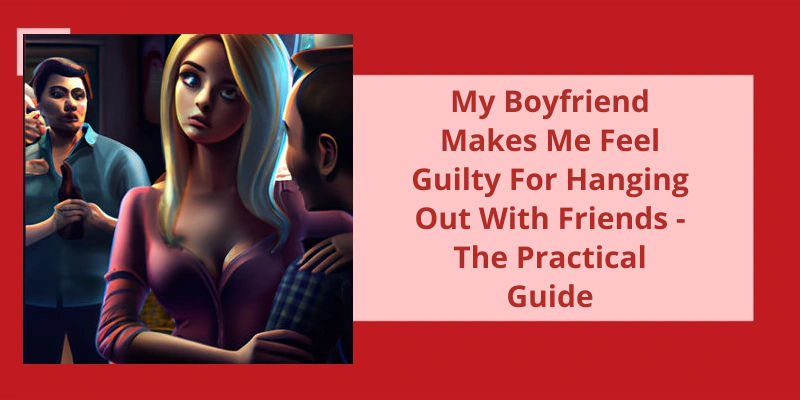Navigating relationships can sometimes be a delicate dance, filled with twists and turns that can leave us feeling unsure of where to step. One common challenge that many individuals face is the feeling of guilt when it comes to spending time with friends while in a romantic partnership. This emotional tug-of-war leaves us questioning if we’re neglecting our partner or if our own needs for social interaction are being undermined. In this practical guide, we will explore the complex dynamics of this situation and provide you with strategies to effectively communicate with your partner, assert your boundaries, and maintain a healthy balance between your friendships and your relationship. Whether you're seeking reassurance, guidance, or simply looking for ways to strengthen your bond, this guide is here to support you in finding the equilibrium you desire.
Is It Okay to Not Want to Hang Out With Your Boyfriend’s Friends?
It’s completely okay to not want to hang out with your boyfriends friends. Each person has their own preferences and comfort levels when it comes to socializing. It’s important to communicate openly and honestly with your partner about your feelings. If you find that spending time with their friends makes you uncomfortable or unhappy, it’s crucial to express this to your partner.
However, it’s important to approach this conversation in a respectful and understanding manner. Acknowledge and validate your partners feelings and explain why you feel the way you do. It’s essential to emphasize that it isn’t a reflection on your partners friends, but rather a personal preference.
Allow your partner the space and freedom to spend time with their friends without feeling guilty or pressuring them to include you. Use this time to engage in activities you enjoy or to hang out with your own friends and loved ones. Remember, healthy relationships thrive on mutual respect and understanding, which includes respecting each others individuality and social choices.
It’s also important to consider compromising and finding a middle ground. Perhaps you can attend some social gatherings with your partners friends that you’re comfortable with, while politely declining others that you’re less interested in. This allows you to show support for your partners social life while also honoring your own boundaries.
Overall, it’s crucial to remember that both partners should have the freedom to maintain their own social lives and friendships. Open and honest communication, along with mutual respect and understanding, can help navigate these situations and ensure that both partners feel supported and comfortable in their social interactions.
Navigating Social Events With Your Partner’s Friends: Tips and Strategies for Managing Social Events With Your Boyfriend’s Friends, Such as How to Handle Awkward Situations, Finding Common Topics of Interest, or Setting Boundaries.
- Be yourself and remain confident in social settings.
- Listen actively and show genuine interest in your partner’s friends.
- Find common interests and engage in conversations about those topics.
- Be open-minded and avoid judgmental behavior.
- Set and communicate your boundaries with your partner beforehand.
- Don’t be afraid to take breaks and have some alone time during longer social events.
- If you encounter an awkward situation, try to diffuse it with humor or by changing the subject.
- Show appreciation for your partner’s friends and their relationships.
- Be supportive of your partner’s friendships and encourage their connection.
- Remember that building relationships with your partner’s friends takes time, so be patient.
It’s natural to feel a tinge of jealousy when your boyfriend spends time with his friends instead of you. This common instinct stems from a desire to be the sole focus of your partner’s attention, and the fear of being replaced by others. While jealousy is a normal emotion, it’s essential to address these feelings and communicate with your partner in order to maintain a healthy and balanced relationship.
Why Am I Jealous of My Boyfriend Hanging Out With His Friends?
It’s natural to feel a twinge of jealousy when your boyfriend spends time with his friends instead of being with you. After all, you want to feel like the most important person in his life, and seeing him bond with others can make you question your own significance. This feeling often arises from a deeply rooted psychological need for our loved ones to prioritize us over others.
Additionally, there might be a fear of missing out on shared experiences and memories. It’s natural to desire inclusion and a sense of belonging, so when these needs aren’t met, jealousy can arise.
Communication is key in addressing these feelings. It’s important to have an open and honest conversation with your boyfriend about how you feel when he spends time with his friends. Expressing your emotions and concerns can help him understand your perspective and find a compromise that meets both of your needs.
Remember, it’s crucial to strike a balance between spending time with your partner and maintaining individual friendships. Encourage each other to have separate social lives and hobbies. This way, you can both enjoy time apart while nurturing your own interests and relationships, which ultimately strengthens your bond as a couple.
Ultimately, overcoming jealousy requires self-reflection and understanding that your partners commitment to you isn’t diminished by spending time with friends.
Source: Why do I get jealous when my boyfriend hangs out with his …
Guilt-tripping, a common phenomenon in relationships, often emerges as a tactic to make one’s partner feel guilty in order to achieve a desired outcome. Although it may occasionally yield immediate results, such as convincing your partner to change their mind, the long-term consequences of guilt-tripping can be detrimental to the overall health and happiness of the relationship.
What Is It Called When Your Partner Makes You Feel Guilty?
It can erode trust and create resentment between both partners. Guilt-tripping is a manipulative tactic that involves making someone feel guilty for their actions or choices, typically to gain control or power in the relationship. It often manifests in subtle ways, such as passive-aggressive comments or withholding affection. This tactic can cause the person being guilt-tripped to feel obligated to prioritize their partners needs or desires over their own, leading to feelings of frustration and unhappiness. It can also create a toxic dynamic where one person constantly has the upper hand, while the other feels trapped and controlled.
When your partner makes you feel guilty for hanging out with friends, it’s important to recognize that this behavior isn’t healthy or fair. Relationships should be built on trust, respect, and mutual support. Guilt-tripping undermines these foundations by manipulating emotions and exerting control. If you find yourself in this situation, it’s crucial to communicate openly with your partner about how their behavior makes you feel. Express your needs and expectations for a healthy relationship, emphasizing the importance of maintaining friendships and individuality outside of the partnership.
Setting boundaries is essential in dealing with guilt-tripping behavior. Clearly define what’s acceptable and what isn’t in your relationship, and make it known that guilt-tripping isn’t tolerated. Be firm in asserting your right to spend time with friends and engage in activities that bring you joy. It’s vital to remember that you aren’t responsible for your partners emotions or happiness. Both individuals should respect and support each others autonomy and personal growth.
If the guilt-tripping behavior continues despite your efforts to address it, seeking outside support may be necessary. Consider talking to a trusted friend, family member, or therapist who can provide objective perspectives and guidance. They can help you navigate the complexities of the situation and empower you to make decisions that prioritize your own well-being. Ultimately, it’s crucial to remember that a healthy relationship is built on mutual respect, trust, and the freedom to pursue personal happiness while supporting each others individuality.
Is It Wrong to Hang Out With Guy Friends When You Have a Boyfriend?
Is it wrong to hang out with guy friends when you’ve a boyfriend? No, it isnt. It’s perfectly normal and a healthy part of any relationship. Having friends of the opposite sex or gender is important for personal growth and social connections. It’s natural to have friendships with people you get along with, regardless of their gender. These friendships can bring different perspectives, support, and enrich your life.
If your boyfriend doesn’t trust you enough to allow you to have friends of the opposite sex, it may indicate deeper issues within the relationship. Trust is the foundation of any healthy partnership, and if he lacks trust, it can lead to controlling and manipulative behavior. In a loving and secure relationship, both partners should be able to maintain their own social lives and have a sense of independence.
It’s crucial to communicate with your partner about your friendships and any concerns they may have. Honest and open conversations can help establish trust and address any insecurities. Reassure them that they’re your priority and that your friendships don’t threaten the relationship.
However, if your boyfriend consistently makes you feel guilty for hanging out with your friends, it may be a sign of emotional manipulation. No one should make you feel guilty or control your social interactions. It’s essential to set healthy boundaries and let your boyfriend know that his behavior isn’t acceptable. If he refuses to respect your boundaries, it may be necessary to reconsider the future of the relationship.
She adds that having a positive relationship with your boyfriend’s friends can contribute to a stronger bond and a more harmonious dynamic within the social circle. However, it’s essential to remember that every relationship is unique and what works for one couple may not work for another. Ultimately, the decision to be friends with your boyfriend’s friends should be based on individual preferences and personal boundaries.
Is It Important to Be Friends With Your Boyfriend’s Friends?
She explains that being friends with your boyfriends friends can strengthen the bond between you and your partner. It shows that you’re interested in his life and the people he cares about, which can make him feel valued and supported. Additionally, being friends with his friends can also make social gatherings and outings more enjoyable for everyone involved. You can easily integrate yourself into their friend group and create a sense of unity and belonging.
However, it’s also important to maintain your own friends and social circle outside of your relationship. Having a healthy balance between your partners friends and your own friends is crucial for maintaining your individuality and personal growth. It allows you to have different experiences, perspectives, and support systems in your life. Your friends can provide you with valuable insights and advice that your boyfriends friends may not be able to offer, as they’ve a different relationship dynamic.
What matters most is open communication and mutual respect. If you and your partner can discuss and navigate this aspect of your relationship together, taking into account each others feelings and needs, you can find a balance that works for both of you. Remember that relationships are built on trust, understanding, and compromise, and being friends with your partners friends can be an incredible asset in creating a strong and fulfilling bond.
Navigating Potential Conflicts: Provide Tips and Strategies for Handling Conflicts That May Arise When Trying to Be Friends With Your Partner’s Friends, Such as Differing Opinions or Personality Clashes.
- Take time to understand different perspectives
- Practice active listening skills
- Communicate openly and honestly
- Find common ground and shared interests
- Respect boundaries and personal space
- Be mindful of your tone and language
- Address conflicts directly but respectfully
- Seek mediation or professional help if needed
- Remember that it’s okay to agree to disagree
- Focus on building individual relationships
Conclusion
In conclusion, navigating the complexities of relationships can often be challenging, especially when it comes to balancing individual needs for social interaction and quality time with a romantic partner. "My Boyfriend Makes Me Feel Guilty for Hanging Out With Friends – The Practical Guide" offers valuable insights into understanding and addressing issues of guilt and manipulation in relationships. It highlights the importance of open communication, setting boundaries, and promoting healthy independence within a partnership. By prioritizing self-care, maintaining strong friendships, and fostering a sense of trust and understanding with our partners, we can create a harmonious balance between our social lives and romantic commitments. Ultimately, it’s crucial to remember that no one should ever feel guilty for maintaining their personal relationships and pursuing their own happiness.






